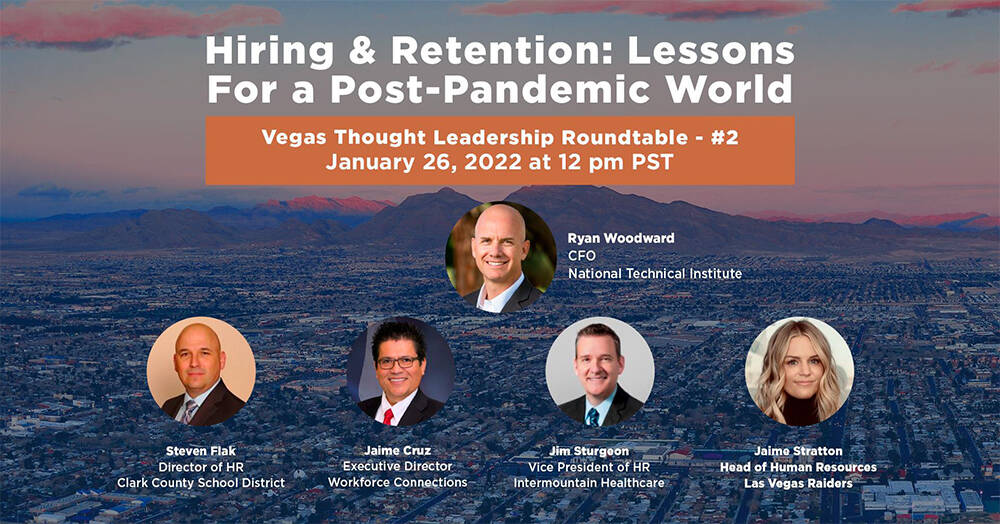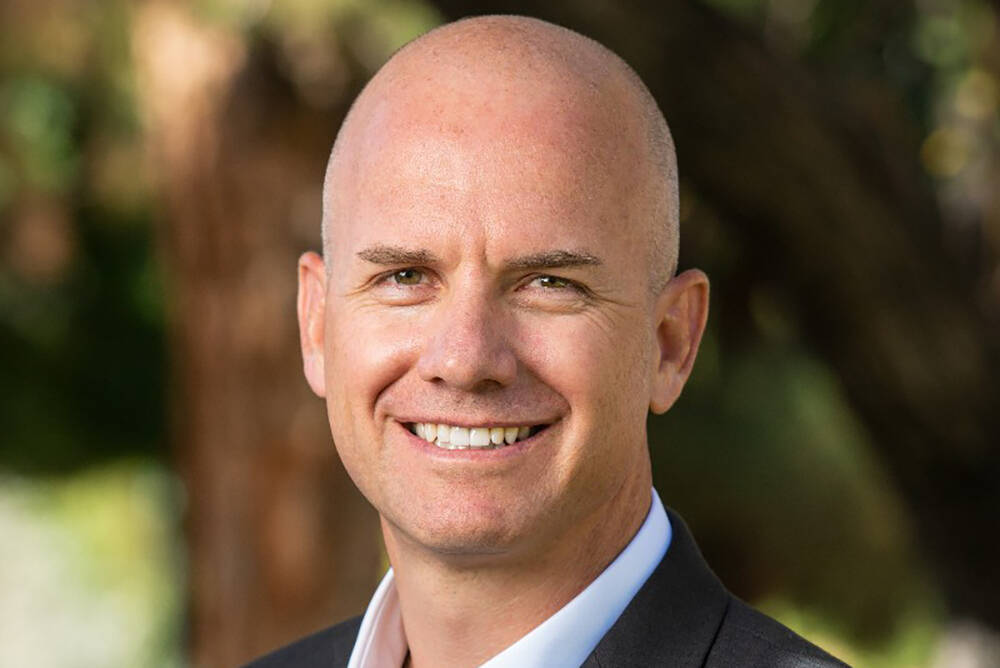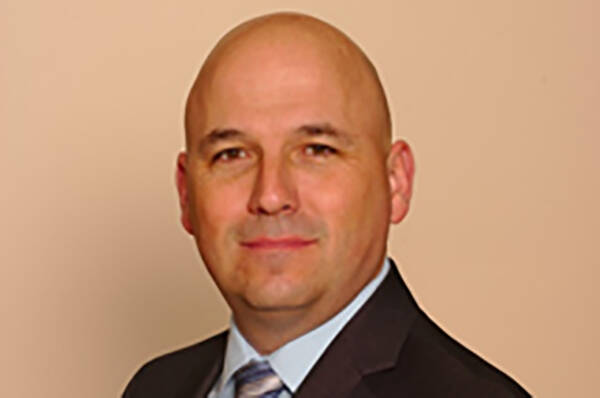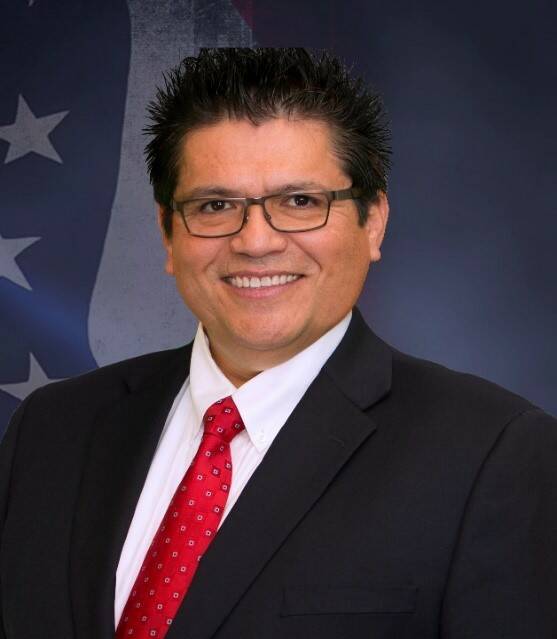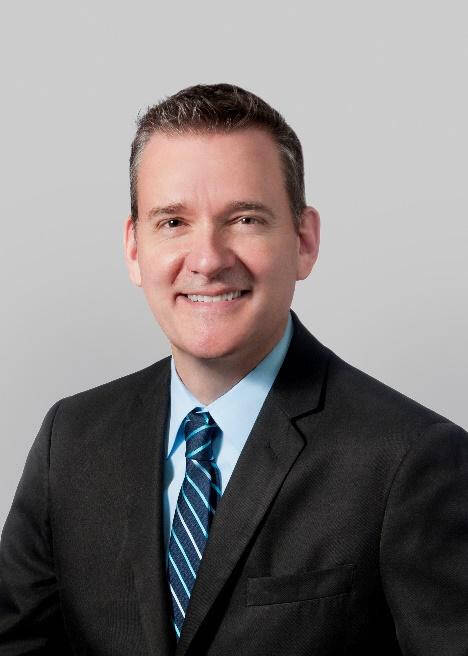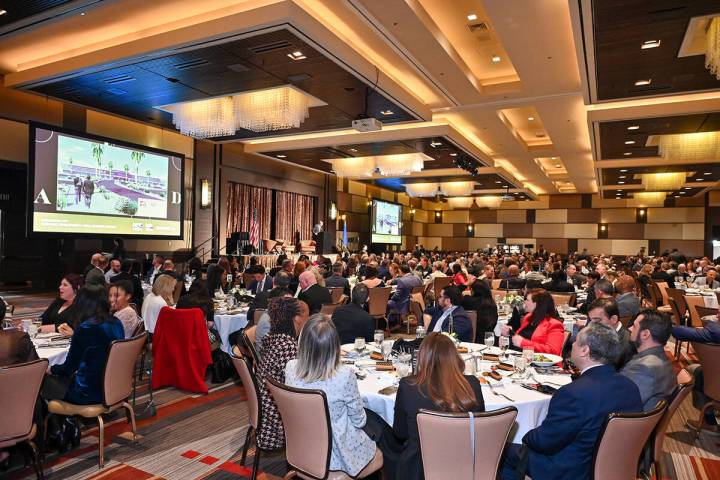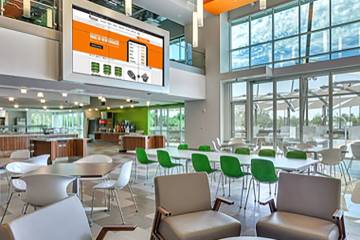Employers continue to find it difficult to hire and retain employees amid the ongoing COVID-19 pandemic, and Las Vegas human resources and workforce experts offered insights on how they’ve been addressing the challenge over the short term and long term. They were part of the Las Vegas Thought Leadership Roundtable Wednesday at the Legacy Club atop Circa Las Vegas. Called “Hiring & Retention: Lessons for a Post-Pandemic World,” the discussions continue to be timely. Click below for video of the event.
“Hiring and retention is a hot topic for all of us right now in the business world,” said Tom Heaton, senior director of advertising with the Las Vegas Review-Journal who introduced the streaming event. “The Department of Employment, Training and Rehabilitation reported we added 95,000 jobs in the state of Nevada between December 2020 and December 2021.
“This is a hot topic. Everybody is worried about employment right now, and how we are going to solve this problem,” said Ryan Woodward, moderator of the program and chief financial officer at the National Technical Institute. He’s co-chair of the Vegas Chamber Workforce Task Force.
Steven Flak, director of human resources for the Clark County School District, outlined some of the steps the CCSD is doing to stop the departure of teachers that districts across the country have faced during the pandemic.
“One of the realizations that people came to over the past couple of years is that they have direct control over their trajectory and their happiness,” Flak said. “They can influence what they do, where they go and work, who they work for and what their why is. When it comes to retaining people, there are two important things to consider. People are looking for a sense of purpose and to be appreciated.”
Flak said if an employer can provide somebody that sense of purpose in how they fit into the organization, fit into the community and how they fit into the world, it goes a long way for retention.
“In addition to that is employee appreciation,” Flak said. “I’m not saying parties or get-togethers or potlucks, but it’s that sincere appreciation that we have for our employees showing up everyday and being able to communicate that. They give up things to come to work everyday. It is conveying to them every day their sense of purpose and how they are appreciated. It’s listening to them and being able to operationalize their feedback.”
CCSD employees already understand their sense of purpose in preparing the community for the future, he added.
“It’s really that appreciation,” Flak said. “Us as an employer; us as a community; us as the media and influencers can do a heck of a lot better job of showing appreciation for them.”
As for attracting talent outside of Las Vegas, Flak said it’s important to let applicants understand right away that the valley is not just the Strip but is a community with many of the same offerings as other cities.
Jaime Cruz, executive director for Workforce Connections, calls these unprecedented times. Pre-pandemic, people were talking about the future of work and what does that look like. They were talking about how in five to 10 years, the workplace would have to adapt to new technologies — artificial intelligence and automation.
“What the pandemic did was accelerate the arrival of the future of work with more remote work and with more technology-based solutions that are replacing jobs,” Cruz said. “There are jobs that are not coming back, (including) 60,000 jobs here on the Strip. The reason why — is across history — is that businesses are in business to make a profit so they find ways to make work more efficient and better ways to provide customer service with the advent of automated products.”
Cruz said what has to be addressed now, is how the skill gap has been accelerated from the pandemic. Workforce Connections is focusing on how that skill-gap remediation needs to be business-driven, and part of the sustainable solution is working with the kindergarten through high school system.
“For too long, not just in Southern Nevada, but the nation has been stuck in this every child must go to college,” Cruz said. “We have to change that. The reality of our economy today, and the one coming is a skill-based economy and credential-based economy so we need to restore the nobility of the trades and make sure young people know that there are six-figure jobs that don’t require a four-or seven-year post-secondary education commitment. We still need doctors, architects and engineers. We just have to get better at the mix.”
Cruz reiterated business needs to have a voice in driving workforce development. The business community should help in designing what’s going to be in that pipeline.
The CCSD is building a new career technical school with a one-stop center public workforce center that’s not happening anywhere else in the nation, Cruz said.
Jim Sturgeon, vice president of HR for Intermountain Healthcare, talked about how the hiring environment has changed so much since 2019.
“Enter the pandemic, we saw a 20 percent reduction of the number of folks we brought into the organization,” Sturgeon said. “We, like so many other employers, did a little bit of a pause understanding what we needed and what the right skill sets were. Low and behold we enter 2021 and now we are hiring at a higher rate than we were in 2019. We saw about a 20 percent swing between those years.”
Along with that, how the company did their hiring completely changed, Sturgeon said. When the pandemic arose, they had to figure out how to find candidates since going to a live job fair was not an option anymore.
“We heavily relied on virtual interviews and virtual mechanisms to reach candidates and advertise our brand and get out there and to go to where those folks were and get them to us,” Sturgeon said. “Interviewing through virtual means was a godsend because we could get to candidates faster and scheduling was easier. Many of them were working remote or had some remote type of role. We had to adapt very quickly, and I am so pleased with what we and so many organizations did to navigate this to be there for the candidates.”
Sturgeon said they are still seeing plenty of candidates. While everyone’s websites and candidate pools are good, there’s a lot more mixture of what’s in those candidate pools that may not be as honed on the skills and experience that they need as an organization.
“So we have to work a little harder on that. Thankfully, the candidates are there,” Sturgeon said.
He said while they get a lot of talent from people who live in Las Vegas, they also have to bring in talent to grow service lines and support patient needs.
“We have to find those folks who have it, and they may not be here,” Sturgeon said. “They may be in specialties that exist outside of the state of Nevada. Throughout the pandemic — and how we are trying to do things today — we are always trying to bring in talent into this area. Our organization has a lot to offer, and we will embrace talent when it comes in and give them meaningful responsibilities and love their skill sets and experience. We want them to know this is an inclusive environment here in Vegas.”
When hiring, it’s vital to watch the trends, Sturgeon said. The company learned through the pandemic that it constantly was changing its business model. Since they went into the virtual visit world with patients, they can expand and get closer to patients through a mechanism they weren’t using before, he said.
“The pandemic really thrusts that into that mechanism as a way to see patients,” Sturgeon said. “There may be a way to bring more specialities and services to patients by thinking more creatively.”
Jaime Stratton is the director of HR for the Las Vegas Raiders.
“In our business of professional sports, there are many more similarities to other businesses in this community,” she said. “Yes, we are a professional football team and have a 53-man roster and coaches. And 17 times a year, we show up to win a game, but that’s what happens on the field. That is the core of our business, but what happens off the field is equally important to us. That takes all kinds of diverse talent. We have accountants and lawyers and people who do sports medicine, who park cars at Allegiant Stadium and serve food. The variety of jobs and depth and scope of the type of talent we’re looking for is pretty special. I would say the move from Oakland to Las Vegas really worked to our advantage, and we feel really lucky to be here in the ‘Entertainment Capital of the World.’ While we are a football team, we are also an entertainment company (in a hospitality city). We want to be a leader in that space and feel very lucky to have a talent pool, who are well trained and understand the notion of providing great experiences.”
The Raiders moved to Las Vegas in March 2020 as the pandemic hit, and that proved to be a challenge, Stratton said. They invested a lot up-front and several years having a plan to to hire 5,000 people, which did not happen because Allegiant Stadium did not open to fans.
“We spent a lot of time refining our process and making sure that we selected the best of the best,” Stratton said. “The challenge for us was not the skill gap but finding people who love football and come in and have great experiences with our fans and visitors. We have a great service experience at Allegiant Stadium and have been able to hold onto that great talent. I attribute that to the investment we made up-front and training and setting expectations. We partnered with the Ritz Carlton to put together service training.”
Since its headquarters could not open in June when it was supposed to because of the pandemic, Stratton said that was a challenge for those who relocated to Las Vegas to work out of the headquarters, only to work from home in a city they didn’t know. They did not start bringing people to the headquarters until April 2021
“It was a challenging time,” Stratton said. “We (had to) figure out how (to) connect with people while they are at home — and 300 employees in a new city, who don’t know anybody except each other, and they can’t even get together We did a lot of virtual connecting and over communicating and a lot of outreach and support.”
The event was supported by REQ, the Vegas Chamber and the Las Vegas Review-Journal. Nevada State Bank and Circa were sponsors.
